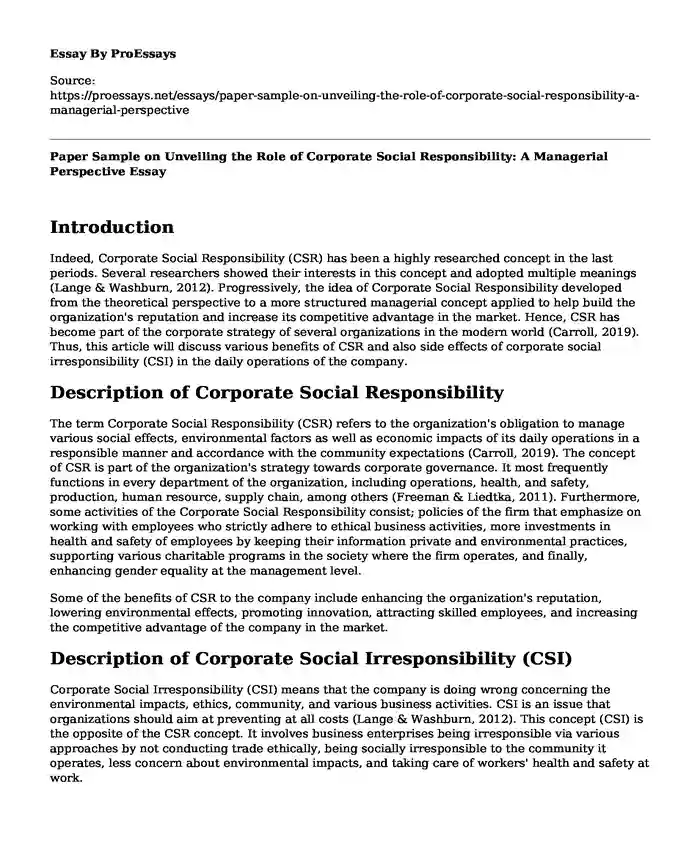Introduction
Indeed, Corporate Social Responsibility (CSR) has been a highly researched concept in the last periods. Several researchers showed their interests in this concept and adopted multiple meanings (Lange & Washburn, 2012). Progressively, the idea of Corporate Social Responsibility developed from the theoretical perspective to a more structured managerial concept applied to help build the organization's reputation and increase its competitive advantage in the market. Hence, CSR has become part of the corporate strategy of several organizations in the modern world (Carroll, 2019). Thus, this article will discuss various benefits of CSR and also side effects of corporate social irresponsibility (CSI) in the daily operations of the company.
Description of Corporate Social Responsibility
The term Corporate Social Responsibility (CSR) refers to the organization's obligation to manage various social effects, environmental factors as well as economic impacts of its daily operations in a responsible manner and accordance with the community expectations (Carroll, 2019). The concept of CSR is part of the organization's strategy towards corporate governance. It most frequently functions in every department of the organization, including operations, health, and safety, production, human resource, supply chain, among others (Freeman & Liedtka, 2011). Furthermore, some activities of the Corporate Social Responsibility consist; policies of the firm that emphasize on working with employees who strictly adhere to ethical business activities, more investments in health and safety of employees by keeping their information private and environmental practices, supporting various charitable programs in the society where the firm operates, and finally, enhancing gender equality at the management level.
Some of the benefits of CSR to the company include enhancing the organization's reputation, lowering environmental effects, promoting innovation, attracting skilled employees, and increasing the competitive advantage of the company in the market.
Description of Corporate Social Irresponsibility (CSI)
Corporate Social Irresponsibility (CSI) means that the company is doing wrong concerning the environmental impacts, ethics, community, and various business activities. CSI is an issue that organizations should aim at preventing at all costs (Lange & Washburn, 2012). This concept (CSI) is the opposite of the CSR concept. It involves business enterprises being irresponsible via various approaches by not conducting trade ethically, being socially irresponsible to the community it operates, less concern about environmental impacts, and taking care of workers' health and safety at work.
Consequently, any organization that acknowledges the concept of corporate social irresponsibility (CSI) risks experiencing a reduction of its reputations, increased environmental impacts, minimize innovation, discourages skilled employees and decreases the competitive advantage of the company in the market (Carroll, 2019). Hence, business firms should avoid the aspect of CSI ultimately to achieve their intended business objectives. They can only realize their goals by adopting corporate social responsibility (CSR) concept in their daily operations.
In my opinion, I stand on the concept of CSR, but I am discouraging companies from embracing the idea of CSI. I support the use of CSR in the company's operations. This concept reduces environmental effects, attracts skilled employees, increases the company's competitive advantage, helps charity programs in the community they are located, and increases the company's reputation, among others.
Conclusion
To conclude, I believe organizations do not have the right to ignore their responsibility to some stakeholders since all the stakeholders contribute proportionately toward the success of the organization. Hence, they must be socially responsible to all the stakeholders. Being socially responsible to all the stakeholders, including community, customers, suppliers, government, among others, leads to a reduction in environmental effects, increases the company's reputations, increased competitive advantage, attracts more innovations among others (Lange & Washburn, 2012). As a result, it leads to economic development, the increased employment rate in the community, and increased innovation. However, being socially irresponsible to the stakeholders lead to increased environmental impacts, a weak economy, a lack of innovations, and the increased unemployment rate among others (Freeman & Liedtka, 2011). Thus, organizations should be socially responsible in society to achieve their operational goals.
References
Carroll, A. B. (2019). Corporate social responsibility: Evolution of a definitional construct. Business & Society, 38(3), 268-295. https://journals.sagepub.com/doi/abs/10.1177/000765039903800303
Freeman, R. E., & Liedtka, J. (2011). Corporate social responsibility: A critical approach. Business Horizons, 34(4), 92-99. https://go.gale.com/ps/i.do?id=GALE%7CA11015279&sid=googleScholar&v=2.1&it=r&linkaccess=abs&issn=00076813&p=AONE&sw=wLange, D., & Washburn, N. T. (2012).
Understanding the attributions of corporate social irresponsibility. Academy of management review, 37(2), 300-326. https://journals.aom.org/doi/abs/10.5465/amr.2010.0522
Cite this page
Paper Sample on Unveiling the Role of Corporate Social Responsibility: A Managerial Perspective. (2023, Sep 17). Retrieved from https://proessays.net/essays/paper-sample-on-unveiling-the-role-of-corporate-social-responsibility-a-managerial-perspective
If you are the original author of this essay and no longer wish to have it published on the ProEssays website, please click below to request its removal:
- The Phenomenon of Leadership Essay Example
- Essay Sample on Brainstorming Techniques
- Group Decision-Making and Abilene Paradox Essay
- Economic Implications of Cloud Computing Essay Example
- Exposure to TV Portraying Interpersonal Conflicts and Controlling in Romantic Relationships: Essay Sample
- Essay Example on Role of Laws in Society: Complexities of Regulating Social Norms
- Paper Example on Growth of Businesses: Strategies to Achieve Successful Outcomes







